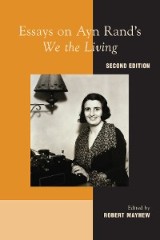Details

Essays on Ayn Rand's "We the Living"
2nd Edition
|
59,99 € |
|
| Verlag: | Lexington Books |
| Format: | EPUB |
| Veröffentl.: | 16.02.2012 |
| ISBN/EAN: | 9780739149713 |
| Sprache: | englisch |
| Anzahl Seiten: | 438 |
DRM-geschütztes eBook, Sie benötigen z.B. Adobe Digital Editions und eine Adobe ID zum Lesen.
Beschreibungen
<span><span><span>Ayn Rand remains a truly significant figure of modern philosophy. Her unique vision of a world in which man, relying on reason, acts wholly for his own good is skillfully developed and illustrated in her most famous novels, </span><span>Atlas Shrugged </span><span>and </span><span>The Fountainhead</span><span>. But Rand's first novel,</span><span> We the Living</span><span>, a lesser-known but no less important book, offers an early form of the author's nascent philosophy—the philosophy Rand later called Objectivism.</span></span><br><span></span><br><span><span>In the second edition, Robert Mayhew once again brings together pre-eminent scholars of Rand's writing. The edition includes three new chapters, as well as an epilogue by renowned Rand-scholar Leonard Peikoff. In part a history of </span><span>We the Living</span><span>, from its earliest drafts to the Italian film later based upon it, Mayhew's collection goes on to explore the enduring significance of Rand's first novel as a work both of philosophy and of literature. For Ayn Rand scholars and fans alike, this enhanced second edition is a compelling examination of a novel that set the tone for some of the most influential philosophical literature to follow.</span></span><br><span></span></span>
<span><span><span>This is the second edition of the study of Ayn Rand’s first novel, </span><span>We the Living</span><span>, which is set in Soviet Russia, and was written in 1936, ten years after she left the U.S.S.R. Topics explored include: the fascinating history behind the novel’s creation; its autobiographical nature; its reception during America’s “Red Decade”; its connection to Victor Hugo (Rand’s favorite novelist); and, the philosophy of freedom and the sanctity of life which it portrays and defends.</span></span></span>
<span><span><span>Preface</span></span><br><span><span>Acknowledgments</span></span><br><span><span>Bibliographical Note</span></span><br><span><span>Part 1: The History of We the Living</span></span><br><span><span>Chapter 1: From Airtight to We the Living: The Drafts of Ayn Rand’s First Novel</span></span><br><span><span>by Shoshana Milgram </span></span><br><span><span>Chapter 2: Parallel Lives: Models and Inspirations for Characters in We the Living</span></span><br><span><span>by Scott McConnell </span></span><br><span><span>Chapter 3: We the Living and the Rosenbaum Family Letters</span></span><br><span><span>by Dina Schein Federman </span></span><br><span><span>Chapter 4: The Education of Kira Argounova and Leo Kovalensky </span></span><br><span><span>by Shoshana Milgram</span></span><br><span><span>Chapter 5: Russian Revolutionary Ideology and We the Living</span></span><br><span><span>by John Ridpath </span></span><br><span><span>Chapter 6: The Music of We the Living</span></span><br><span><span>by Michael S. Berliner </span></span><br><span><span>Chapter 7: Publishing We the Living</span></span><br><span><span>by Richard E. Ralston </span></span><br><span><span>Chapter 8: Reviews of We the Living</span></span><br><span><span>by Michael S. Berliner </span></span><br><span><span>Chapter 9: Adapting We the Living</span></span><br><span><span>by Jeff Britting </span></span><br><span><span>Chapter 10: We the Living: ‘36 and ‘59</span></span><br><span><span>by Robert Mayhew </span></span><br><span><span>Part 2: We the Living as Literature and as Philosophy </span></span><br><span><span>Chapter 11: We the Living and Victor Hugo: Ayn Rand’s First Novel and the Novelist She Ranked First</span></span><br><span><span>by Shoshana Milgram </span></span><br><span><span>Chapter 12: Red Pawn: Ayn Rand’s other Story of Soviet Russia </span></span><br><span><span>by Jena Trammell </span></span><br><span><span>Chapter 13: The Integration of Plot and Theme in We the Living</span></span><br><span><span>by Andrew Bernstein </span></span><br><span><span>Chapter 14: The sacred in We the Living</span></span><br><span><span>by Robert Mayhew</span></span><br><span><span>Chapter 15: The Plight of Leo Kovalensky</span></span><br><span><span>by Onkar Ghate</span></span><br><span><span>Chapter 16: Kira’s Family</span></span><br><span><span>by John David Lewis </span></span><br><span><span>Chapter 17: Kira Argounova Laughed: Humor and Joy in We the Living</span></span><br><span><span>by Robert Mayhew </span></span><br><span><span>Chapter 18: Forbidding Life to Those Still Living</span></span><br><span><span>by Tara Smith </span></span><br><span><span>Chapter 19: The Death Premise in We the Living and Atlas Shrugged</span></span><br><span><span>by Onkar Ghate </span></span><br><span><span>Epilogue: Introduction to We the Living</span></span><br><span><span>by Leonard Peikoff </span></span><br><span><span>Select Bibliography</span></span><br><span><span>Index</span></span><br><span><span>About the Contributors</span></span></span>
<span><span><span>Robert Mayhew</span><span> is professor of philosophy at Seton Hall University.</span></span><br><span></span></span>

















